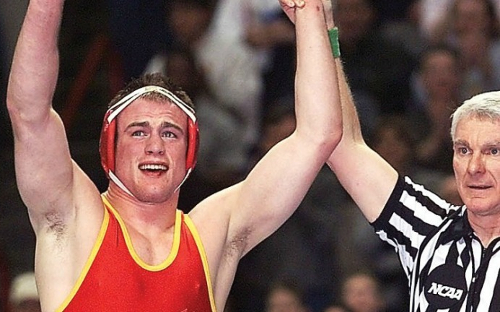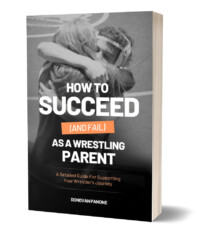
Competing is a critical step in the developmental process. That’s what wrestling is all about. This is not a sport like Taekwondo where progress is based on the teacher deciding you have done enough to earn the next level. If you never learn how to compete, you will be left behind developmentally and then practices become miserable if you are losing all the time. But at the same time, it’s easy to get so caught up in it, compete too often and lose sight of the ultimate goal, which is to develop as a wrestler. You want to find a good balance between training, developing skills and competing.
Why competition is essential for developing as a wrestler
Many of these benefits are the exact life lessons we want wrestlers to get from the sport. Without actually competing, they don’t fully absorb these lessons. You can wrestle matches in practice, but those don’t feel official. They don’t “mean” anything. The following are some of the main developmental benefits of competing:
- Sharpens reaction time and instincts – Wrestling moves faster when something is on the line…when there are consequences. This pace is something that can’t be simulated in practice and is something that wrestlers adapt to over time.
- Learn how to prepare for a “big moment” – Since real matches seem to mean more, this helps wrestlers start developing a pre-match routine that calms their nerves and gets them focused. It can also help them learn how to keep perspective and not make individual matches feel bigger than they need to be.
- Learn to perform and stay calm under pressure – During matches, when it’s possible to feel anxiety, wrestlers learn how to breathe, tune out distractions and re-focus. The more they do this, the more it steels their nerves and they can handle anything thrown their way.
- Provides immediate feedback on skill development – This is the time to see if what you have been working on in practice will work in real competition. If it does, you get positive feedback, and it feels great to execute it. If it doesn’t work, it shows you exactly what parts need working on so you can keep improving.
- Personalized coaching during and after matches – While things are fresh, the coach can provide you direct input for what you did well and what you need to keep working on.
- Bouncing back from adversity – Losing teaches you how to evaluate what happened, learn and bounce back to try again. This process is part of the long game, but wrestlers also learn to have a short memory at tournaments and quickly put negative experiences behind them to move forward.
- Setting goals and going after them – Whether they formally set goals or not, they all have something they are trying to achieve. It could be winning a single match, beating a particular opponent, winning a small tournament or going after a big goal like a state or national event. These goals fuel their hunger and their training. They learn how to work hard to go after something they desire. Competing is necessary for this lesson to exist.
- It makes them hungry to train – When you compete and lose, you don’t want that feeling again. You can taste what victory could have been and it causes you to get more dialed in.
Participation/retention relationship study
In fact, I did a study for Team Georgia. There was a large proportion of wrestlers who had USA Wrestling memberships, but were not competing at events. Or they had competed in novice events, but were not returning to move up into the open events. The primary reason parents gave was that they didn’t feel their wrestler was ready and didn’t want to hurt their confidence. Some coaches were buying into this also or were afraid to encourage their wrestlers to compete.
The study I did was to identify the relationship between participation and retention. Since the reasoning was that it was better to wait a season to learn the sport and “be ready” before competing, I wanted to see if those kids ever returned to the sport the next year. I had access to all the membership data and cross-referenced their USA Wrestling numbers with registrations for all the tournaments during the season. This included both beginner tournaments and open events. I then looked at how many of those memberships were renewed the following year. The data I found was overwhelming:
Of all first year wrestlers…
97% returned the next season when they attended at least one event
Only 6% returned the next season when they DID NOT attend an event
Of course some of the kids who didn’t compete and didn’t return probably didn’t like the sport enough to attend a competition in the first place. But maybe if they had at least tried, they would be part of that 97% who returned the next year.
It’s about making incremental progress
I’m not saying wrestlers should jump in the deep end right away. They can build up how often they compete and the skill level of their competition over time. But after they’ve learned the basics, they should start wrestling other beginners and learn how to compete. Not master the basics…learn the basics. The top wrestlers in the world are still working on mastering the basics.
The decision to begin competing in wrestling tournaments is somewhat child- and age-dependent. You want their first experience to be positive, but you also shouldn’t protect them from doing hard things. Ultimately if they are truly going to enjoy the sport and reap its benefits, they need to be competing.
Wrestling is a tough sport and kids need to feel like they are making progress in order to enjoy it. I’ve learned that making incremental progress is what motivates kids to stick with the sport. It isn’t just about winning. It is about seeing their hard work pay off and knowing that, if they keep working, they will find higher levels of success. It’s this chase for success that is more addicting than the winning itself.
Over the years, I’ve seen parents on the extreme ends of the spectrum. Parents hold them back from competing until they are “ready” or their wrestler finds early success and immediately starts touring them across the country. Both approaches are wrong.
Winning, losing and jumping levels
Go compete, take some lumps, adapt, find some success, build confidence and then jump a level. Losing too much too quickly makes them think they aren’t good enough for the sport. If it’s too easy, it gives them a false sense of confidence and their skills won’t improve. Too many losses in a row will mess with even the most naturally confident kid, so you need to find the balance. Feed the hunger and challenge them, but know when to pull back.
There is no perfect formula for the amount of losses they should take. I’ve heard some people say they want their kid to lose 50% of their matches so they stay challenged. I get what they are saying but it’s kinda dumb. Kids can get “used to” losing all the time and not figuring out how to win. Ideally, you want them to learn how to fight and win and adapt to their surroundings before moving them up to the next challenge. Adapting doesn’t necessarily involve winning every match. It just means understanding how to win, while also learning from losses and setbacks, is a critical part of the process.
More details in the book

STAY IN THE LOOP

